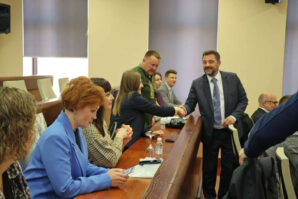 The small town of Bihac near Bosnia’s border with Croatia is facing a growing migrant influx. The Red Cross says that the central government isn’t doing enough.
The small town of Bihac near Bosnia’s border with Croatia is facing a growing migrant influx. The Red Cross says that the central government isn’t doing enough.
There are increasing numbers of refugees and migrants congregating in the Bosnian town of Bihac. Unable to go forward, unwilling to go back. As the winter approaches the situation for those in the town is predicted to get worse. The vast majority live in improvised camps, which lack even basic facilities such as tents and hygienic sanitation.
The International Organization for Migration (IOM) meanwhile says that the main official camp, Vucjak, is currently at overflowing capacity. Since June, it has not been able to accept any new migrants, forcing recent arrivals to sleep rough. Built at a former garbage dump site, most residents of Vucjak were taken there against their will; being stuck at the camp limits their chances of actually succeeding in accessing EU countries, as they are monitored there. Some have called the conditions there ‘inhumane.’
The Red Cross has now appealed to the Bosnian government to get further involved. Selam Midzic, head of the Red Cross in Bihac, told the German DPA news agency that the government is complicit in the suffering of the migrants there:
“They’re just unloading the entire migration crisis onto Bihac and the Una-Sana Canton,” he said, adding that the funds made available by the government in Sarajevo were far from sufficient, as one in seven people in the area is now a migrant.
Midzic also highlighted that the authorities in Bosnia failed to cooperate with international aid groups, which he said was in breach of international law.
Being situated near the Croatian border, Bihac and its Una-Sana Canton have become a magnet for migrants who are hoping to cross into EU territory. However, violent push-backs by Croatian border forces have resulted in a continuous buildup of migrants in the area – many of whom report having sustained physical injuries in altercations with Croatian authorities while trying to cross over into Croatian territory.
Migrants staying in Bihac have meanwhile coined a new term for their attempts to cross into Crotia: ‘the game.’ Those that manage to go undetected all the way to central Europe are deemed to “win” at the game, while those that lose are beaten up and have their valuables confiscated before being sent back across the border.
Croatian authorities deny the allegation against them; however, Croatian President Kolinda Grabar-Kitarovic admitted in a television interview earlier in the year that police would have to use “a little bit” of violence in dealing with irregular migrants.
An estimated 7,000 migrants are currently stuck in and around Bihac, with numbers expected to rise as more migrants have in recent months managed to embark on the so-called Balkan route further south in the direction of Bosnia again.
With winter coming, many fear that the living conditions for migrants could further deteriorate. Midzic said that the Red Cross is doing its best to “obtain heated tents and insulate their floors against moisture and mud” in a bid to avert a humanitarian crisis.
Colder temperatures have already begun to settle in the mountainous region around Bihac. While there are no official figures confirming that any migrants or refugees may have frozen to death so far, there are known cases of deaths related to migrants dying in a fire which was started after migrants attempted to warm up around a candle.















